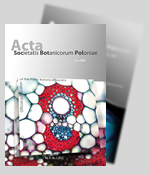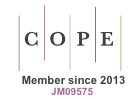Abstract
The state of cellular membranes is strictly dependent on grain ripeness. The electoconductivity of cell exudates is greatest in milk-ripe grain, lower during wax ripeness . and smallest in fully-ripe grain. This decrease in conductivity of the cell exudates as the grain matures is accompanied by an increase in the level of phospholipid, in the embryonic mitochondria. The permeability of the cell membranes is also, considerably affected by the method of grain harvesting. The exudates from grain threshed immediately after collection demonstrated a greater electroconductivity than those from grain kept in ears for two weeks prior to threshing, whereby these differences were particularly distinct in wax-ripe grain, but less so in fully-ripe grain. The reasons for these effects are discussed.
Keywords
membranes permeability; wheat grain; different ripeness







